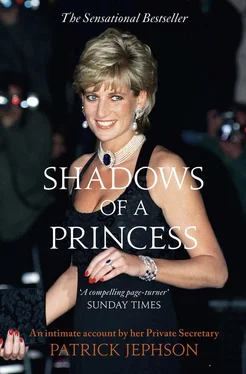An army of practitioners went in and out of favour. Among the masseurs, Stephen Twigg was a favourite. She believed that his trademark deep-tissue technique helped to relieve her of conveniently unspecific aches and pains caused by stress.
Colonic irrigation was another popular discovery, thanks to the Duchess of York. The semi-medical procedures and professional intimacy were highly attractive. So too was the skill and sympathy of the eminent Chrissie Fitzgerald, who so dexterously wielded the various tubes and solutions. The attraction, which survived for several years, waned abruptly as Chrissie’s treatment started to be accompanied by doses of robust common sense. Her crime, it appeared, was to be insufficiently sympathetic to the injustices of her royal client’s existence – perhaps because she had witnessed darker shades of the same misfortune further down the social scale. She also did not take kindly to the press attention which the Princess seemed powerless to stop bringing, literally, to her door. Chrissie was dropped abruptly, even brutally, soon afterwards. Others found it easier to keep to their script.
Fitness trainers such as Carolan Brown remained in favour until the Princess’s death, as did relays of astrologers. Some, however, such as psychotherapist Susie Orbach or self-improvement guru Anthony Robbins, found their work less conducive to the quick fix that she craved.
Sympathy and attention rather than reality were what the Princess sought. She paid no more than lip service to the alternative lifestyles on offer and did not embrace the complementary medicine philosophy in the way that her husband did. Nonetheless, if her exploration of her own health needs lacked conviction or direction, her attitude to her therapists did not. Their greatest value was in the attention they lavished on her.
Some became highly influential and coloured her thinking, with unpredictable results. Called upon to speak publicly on health or social issues, she would sometimes show an alarming tendency to recycle advice she had imperfectly understood from one of these unofficial sources. Following the thoughts of a current favourite, she once spoke convincingly of children’s status as ‘miniature adults’ – to the consternation of the patronage involved, which preferred to think of them as anything but.
Quite apart from the frustration it caused her official advisers, this hunger for guidance from dubious sources had a destructive effect on the Princess’s own judgement, a quality she did not lack when she applied herself. She sowed gossip and traded rumour with them and they in turn encouraged a sense of infallibility which undermined her innate sense of self-preservation. A blind belief in her own intuition increasingly became a substitute for balanced analysis, or even plain common sense.
It also undermined her sense of the ridiculous. ‘Do you know,’ she said to me one day in June 1992, ‘my astrologer says my husband will never be king!’ That may have been exactly what she wanted to hear at the time, but it did not appear to alter her husband’s daily routine one jot. Yet she continued to heed her astrologers’ predictions, the more dire the better, particularly where the Prince was concerned. Sure enough, she was rewarded with regular forecasts of helicopter crashes, skiing accidents and other calamities that obstinately refused to befall him – much to her relief, I have no doubt.
Ultimately she lost touch with reality in her restless desire for reassurance. In the last year of her life she was quoted in Le Monde as saying, ‘I don’t need to take advice from anyone. I trust my own instincts.’
The truth was, she consumed advice insatiably and, depending on her mood, she would take it from anyone. Her credulity seemed directly proportional to the thrill factor of whatever prediction she was being invited to believe – which made her pretty much like the rest of us, I reluctantly concluded.
Even so, I thought it important to affect a cheerful cynicism about every latest fad. My light-hearted attitude was intended to acknowledge the need for attention without conceding that she was anything other than physically fit as a fiddle. I never knew her to be genuinely ill for a single day. She kept her side of the pact by allowing – and maybe even welcoming – my theatrical disapproval as she swallowed the latest offerings from her army of alternative practitioners. As a reassuring contrast, I extolled the more traditional merits of hot whisky and a good book as aids to happy slumber. Perhaps sensibly, however, she avoided alcohol.
The real problem was that she had no safe substitute for the wise, supportive and unpaid company which, in the end, was the only medicine she really needed. Underneath the light-heartedness I was worried about her growing tendency to find pseudo-medical excuses for attracting attention and sympathy. She became increasingly indiscriminate in her search for physical remedies for emotional disorders. Complementary cures were freely interspersed with more conventional sleeping pills and stimulants.
The effect of these combinations was anybody’s guess, since no single doctor knew what she was dosing herself with, let alone controlled her intake. Deep-tissue massage and painful vitamin injections also became regular features of pre-tour preparations. Once, in a fit of hypochondria, she wangled an urgent MRI scan. Unsurprisingly, the scan confirmed my own less penetrating diagnosis: she was as fit as a fiddle.
Reassurances and remedies were all to little effect in lonely hotels and guest residences, however. All the pills in the world did not seem able to help then, and she fell back into less esoteric habits. Too often, time spent in her room supposedly relaxing was spent in obsessive phone calls – gossip with girlfriends; gossip and flirting with admirers; gossip and intrigue with palace staff back home; and, on the plus side, laughter and light relief with her children, whom she missed acutely whenever she was abroad without them.
Nothing she took seemed to dull her quick-wittedness, or her quick tongue. Depending on her mood, I found that she could be perceptive and thoughtful with her praise and encouragement, if a little inconsistent. Getting a pat on the back one day did not protect you from being kicked the day after for doing the same thing.
When she was unhappy, her natural suspicion and deviousness took control. Then her verbal skills were employed to hurt and confuse. When roused, she used words like tomahawks and her aim seldom failed. She would know, with a cat’s cunning, when to let you feel the claw in her velvet paw. Like the predator she sometimes was, she would stalk her victim, waiting for his or her attention to be distracted before striking.
Typically, we might be on a train about to arrive at our destination and my mind would be preoccupied with the practical demands of the next few minutes, when she would see her opportunity. Her voice would take on that tone of guileless inconsequentiality that always made the hairs stand up on the back of my neck.
‘Patrick, you never told me I’d been invited to speak at the Sprained Wrist Association AGM. I know you wouldn’t understand, but people with sprained wrists are excluded by society. I think we ought to make a speech about it.’
The opening volley was designed to saturate my defences. While still distractedly craning out of the window for a telltale sign of red carpet and a press posse, I would subconsciously assess the incoming missiles:
- She has deliberately chosen a bad moment for me. This kind of premeditation always spells trouble. Look out for the second salvo. (My God, I hope she doesn’t know about that business with her new car…)
- She is accusing me of deliberately concealing an invitation from her because I disapprove of it or because I am too lazy to research it. (Both true on occasions, as she probably knows.)
Читать дальше












